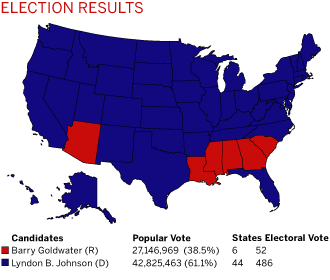President Lyndon B. Johnson, who took office following John F. Kennedy’s assassination in November 1963, enhanced his image as a tough legislator by winning a hard-fought battle to pass the landmark Civil Rights Act of 1964, which guaranteed African-Americans access to all public facilities, and banned discrimination by race, religion, or sex. The Vietnam War was escalating, but had yet to become a real liability for Johnson.
The margin of Johnson’s landslide victory in 1964 was partly a repudiation of Barry Goldwater’s extreme right-wing views. Goldwater, an Arizona senator and author of the best-selling book The Conscience of a Conservative, won the Republican nomination after a bitter primary campaign against moderate New York Governor Nelson Rockefeller. In his acceptance speech, Goldwater made the infamous statement, "Extremism in the defense of liberty is no vice. Moderation in the pursuit of justice is no virtue." The assertion, meant as a defense of conservatism, merged in the public consciousness with statements in which Goldwater advocated the use of tactical nuclear weapons in Vietnam and argued that Social Security be made voluntary.
Democrat
Lyndon Johnson for president
Hubert Humphrey for vice president
"Vote for President Johnson on November 3. The Stakes Are Too High for You to Stay at Home"
The most celebrated and perhaps most notorious of all political commercials was aired as a paid spot just once, during the NBC Movie of the Week on September 7, 1964. In Johnson’s "Peace Little Girl (Daisy)" ad, a young girl counts to ten as she picks the petals off a daisy. When she reaches nine, an ominous adult voice begins counting down to zero as a close-up of the little girl dissolves to a nuclear explosion. Tony Schwartz, the ad’s creator, called it "the first Rorschach test on the American public." Without mentioning Goldwater or citing any statements by him, the ad exploited the established public fear that he would start a nuclear war if elected president.
The Goldwater campaign vigorously protested the ad. Republican National Committee chairman Dean Burch said, "This horror-type commercial is designed to arouse basic emotions and has no place in the campaign." The Democrats withdrew it, but the controversy led to its being replayed in its entirety on network news and commentary programs, and the "daisy girl" made the cover of Time.
With its suggestive style and provocative sounds and visuals, the daisy ad exemplified Johnson’s innovative commercials, which were produced by the vanguard New York agency Doyle Dane Bernbach and were almost exclusively attack ads.
President Kennedy had been impressed by the strikingly modern approach of the agency’s Volkswagen "Think Small" and Avis "We Try Harder" campaigns, and the agency was contracted by the Democrats in the summer of 1963. Madison Avenue had been avoiding the Democrats since the days of Stevenson, but the agency accepted the account promptly, later explaining to Johnson’s advisers, "We are deadly afraid of Goldwater and feel that the world must be handed a Johnson landslide."
Republican
Barry Goldwater for president
William Miller for vice president
"In Your Heart You Know He’s Right"
Compared to the Johnson ads, Goldwater’s were old-fashioned, with extensive use of talking-head endorsements and a series of commercials emulating "Eisenhower Answers America." The ads reflected the fundamental problem of Goldwater’s campaign, namely that he was almost always on the defensive, constantly explaining his statements or responding to charges against him. The ads probably exacerbated Goldwater’s problems by keeping the original charges (of war-mongering, of intending to dismantle Social Security) in the public consciousness.
As the defensive commercials proved ineffective, a second wave of ads attempted to launch a counterattack. But a Goldwater ad juxtaposing images of Khrushchev shouting, "We Will Bury You!"
with American children reciting the pledge of allegiance was undercut by Khrushchev’s ouster in October. Attempts to link Johnson to charges of influence-peddling by his associates Bobby Baker and Billie Sol Estes were also ineffective, because the charges seemed trivial compared to those leveled against Goldwater, and because no one had been able to link Johnson to any specific illegal activities. Even Goldwater’s slogan, "In Your Heart You Know He’s Right," backfired, spawning bumper stickers and buttons that twisted it to "In Your Heart You Know He Might," "In Your Head You Know He’s Wrong," and "In Your Guts You Know He’s Nuts."
The campaign relied less on spot commercials than on half-hour broadcasts, which were used as fundraising appeals. One of Goldwater’s most effective half-hour programs was an endorsement speech by Ronald Reagan that put the Hollywood actor in the national spotlight as a political figure, leading to his successful run for governor of California in 1966.
